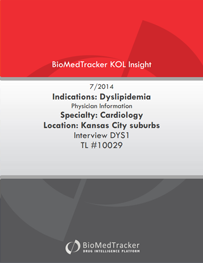Report Library
All Reports
Dyslipidemia KOL Insight Interview #1
July 25, 2014
BioMedTracker will be offering KOL Reports and Physician Pulse Surveys through 2014
for purchase a la carte, or access to all reports and surveys can be purchased as a
subscription to KOL Insight. For more information on KOL Insight subscription, please
email BioMedTracker
or call BioMedTracker Client Services at (858) 200-2357.
KOL Highlights
For our disclosures, please read the BioMedTracker Research Standards.
KOL Highlights
- Dyslipidemia, PCSK9 and CETP Inhibitors
- Cardiologists in KOL's large group sticking to old cholesterol guidelines and goals.
- Statin intolerant: about ~5% of his cardiology patients, with 30-40% able to still reach the 100 mg/dl goal but hardly any a 70 mg/dl goal.
- Statin tolerant: 90% can reach 100 mg/dl goal and about 70% the 70 mg/dl goal. If patients are in the 80's, close enough.
- Prior to outcomes studies, would recommend PCSK9 inhibitors in most patients with
LDL-c over 180
mg/dl, a minority with LDL-c 110 mg/dl or lower, and 50-60% of those in between. 70-80%
would accept the
recommendations and be compliant.
- Believes in LDL-c hypothesis, but still wary about drugs without outcomes trials.
- Discusses usage of PCSK9 and CETP inhibitors in various scenarios based on
outcomes data (see
table in full report for summary). In addition:
- Diabetics and some others may still prefer injection if outcomes benefits similar.
- If patients take CETP inhibitors and still do not reach old LDL-c goals, would not add PCSK9 inhibitor.
- If CETP inhibitors only effective in those with low HDL-c, impacts ~30% of patients.
- Prior to information on patient discomfort, thinks alirocumab (REGN, SNY) two injections/month will be preferred over biweekly injections or evolocumab (AMGN) monthly mini-doser.
- Copays need to be less than $100 in his lower to middle income population. If one class has $50 copay and another $100, only expects modest impact on patient preferences.
- Not very concerned about potential cognitive side effects with PCSK9 inhibitors. Cardiovascular Disease, Zontivity
- Most with an MI get a drug-eluting stent with P2Y12 anti-platelet agents for a year.
- Less than 5% are recommended to stay on them longer, and it is quite rare particularly for Effient or Ticagrelor.
- Would use in most of post-MI patient, but according to how it was studied: in those with an MI 2 weeks to 12 months in the past.
- About 20% at high risk for bleeding—would not use in those. Otherwise, bleeding risk does not look too bad if not post-stroke or ACS patient.
For our disclosures, please read the BioMedTracker Research Standards.
| Disease Group Covered: | Cardiovascular |
Additional Resources:
